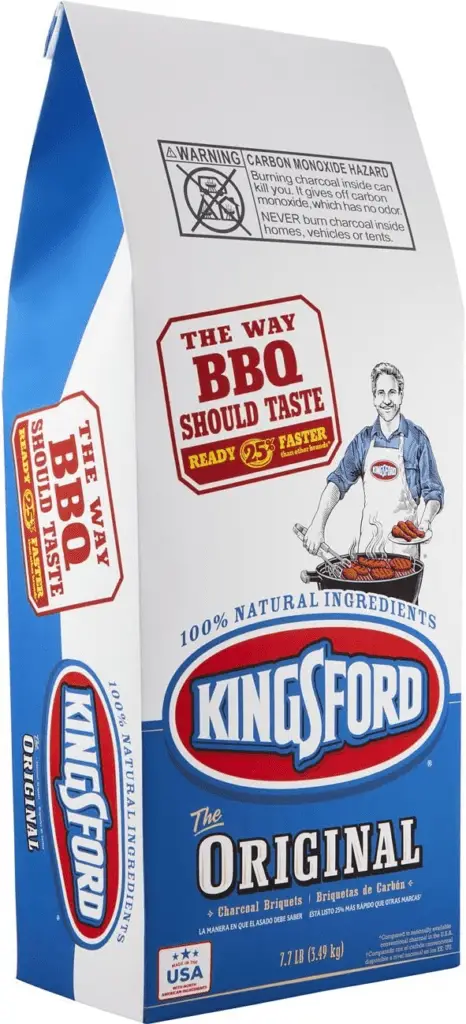Share via:
If you’re a grill master, you know that the key to perfectly grilled food is the fuel you use. Charcoal briquettes are a popular choice for charcoal grills if you want consistent heat and a long burning time.

But what happens when you have a bag of charcoal briquettes sitting in your garage for months or even years? Do charcoal briquettes go bad?
The short answer is that charcoal briquettes do not technically expire, but their shelf life is not indefinite. Over time, the briquettes can lose their effectiveness and may not burn as well as they once did. This can be due to a number of factors such as exposure to moisture, changes in temperature, and even simple aging.
In this grillcuisines.com guide, we’ll cover:
- Does charcoal briquette expire?
- A closer look at the shelf life of charcoal briquettes.
- How to store charcoal briquettes properly and how to tell if they’ve gone bad.
How Charcoal Briquettes Are Made?
The primary component of charcoal briquettes is charcoal, which is a lightweight black carbon residue produced by removing water and other volatile constituents from animal and plant materials.
In charcoal briquettes, the charcoal is usually made from sawdust or other wood waste that has been compressed into a solid form.
The sawdust or wood waste is mixed with various binders, such as starch or clay, to help hold the briquette together.
Other additives may also be added to enhance burning performance or to add color or scent. The mixture is then fed into a machine that compresses it into a specific shape, usually a pillow-like form.
The compressed briquettes are then dried and heated to remove any remaining moisture and volatile components. This process, known as carbonization, helps to convert the compressed sawdust into a stable and burnable fuel source.
During carbonization, the temperature inside the kiln is carefully controlled to prevent the briquettes from breaking apart or losing their shape.
Once the briquettes have been carbonized, they are cooled and packaged for sale. Some manufacturers add additional flavorings or scents to their briquettes to enhance the cooking experience.
Others may produce specialized briquettes for specific cooking needs, such as long-burning briquettes for slow cooking applications like smoking.
Some brands like Kingsford Original Charcoal Briquettes are considered as the longest burning charcoal briquettes.

Overall, the process of making charcoal briquettes is a carefully controlled and complex process. The quality of the briquettes can vary depending on the quality of the raw materials used, the binder and additives added, and the manufacturing process itself.
Lump Charcoal vs Charocal Briquettes
Lump Charcoal:
Lump charcoal is made by burning wood in the absence of oxygen until it carbonizes. As a result, lumps of charcoal are formed that are irregular in shape and size. Hardwood charcoal is in itself lump charcoal.
When you burn lump charcoal with lighter fluid it burns hotter and faster than charcoal briquettes, which can be both an advantage and a disadvantage. As they burn faster you can get high temperatures quickly and start grilling food within 10-15 minutes.
Related > > Can You Use Charcoal Lighter Fluid In A Lighter [SAFE ALTERNATIVES]
As a result, your charcoal may not last as long, so you’ll need to keep an eye on it and replenish it more often.
Charcoal briquettes:
Charcoal briquettes, on the other hand, are made from compressed charcoal dust and other ingredients, such as sawdust, coal dust, starch, borax, or any other binding agent.
They are uniform in shape and size and burn more slowly and evenly than lump charcoal. This makes them an excellent choice for low and slow cooking, such as smoking meat.
They may take longer to heat up, but they can burn for longer periods, so you don’t need to add more charcoal as frequently.
In terms of burn time, lump charcoal typically burns faster than charcoal briquettes, but the actual burn time or how long charcoal last depends on a number of variables.
Do charcoal briquettes Go Bad? A closer look at the shelf life of charcoal briquettes.
What’s the shelf life of charcoal briquettes? It’s important to understand that charcoal briquettes do not have an expiration date.
They can lose their effectiveness over time if they are not stored properly or if they are exposed to moisture.
But even though charcoal is relatively stable, it can still be affected by the environment. There are several factors that can affect the shelf life of charcoal briquettes:
1- Moisture
Charcoal briquettes can absorb moisture from the air, which can make them difficult to light and burn. Moisture can also cause the briquettes to break apart and crumble, making them unusable.
2- Exposure to Air
Charcoal briquettes can also be affected by exposure to air. When charcoal briquettes are exposed to air for an extended period of time, they can become brittle and difficult to light. This is because the charcoal inside the briquette can oxidize, reducing its effectiveness as a fuel source.
3- Storage Conditions
The way charcoal briquettes are stored can also impact their shelf life. Briquettes should be stored in a cool, dry place away from moisture and humidity.
If they are stored in a damp or humid environment, they can become moldy or develop other problems that can make them unsafe to use.
4- Quality of the briquettes
The quality of the briquettes themselves can also affect their shelf life. Briquettes that are made from low-quality materials or that are poorly manufactured may not last as long as higher quality briquettes.
5- Additives
Some charcoal briquettes contain additives, such as lighter fluid or binders, that can affect their shelf life. If these additives are not properly mixed into the briquette, they can cause problems with burning or cause the briquettes to break apart.
One of the most commonly used additives is a binder, which is typically made of starch or a similar substance.
The binder helps to hold the briquette together and prevent it from falling apart during transportation and storage. Binders can also affect the burning time and temperature of the briquettes.
Another additive that can affect the performance of charcoal briquettes is the accelerant. This is a substance that is added to the briquette to make it easier to light and to help it burn more quickly and at a higher temperature. Some common accelerants include lighter fluid, paraffin wax, and mineral oil.
Other additives that may be used in the production of charcoal briquettes include sawdust, limestone, borax, and sodium nitrate.
Sawdust is used to increase the density of the briquette and improve its burning time, while limestone is added to help reduce smoke and improve the quality of the ash produced.
Borax and sodium nitrate are used as a preservative to help extend the shelf life of the briquettes.
Overall, the additives used in charcoal briquettes can play a significant role in their quality and performance, setting them apart from other brands and making them more desirable to consumers.
It is important to note that not all additives are created equal, and some may have negative impacts on the environment or health. It is important to choose charcoal briquettes made with high-quality, safe additives, and to follow proper storage and usage guidelines to ensure the best performance and longevity.
How long do charcoal briquettes last?
It depends on several factors, including how they are stored and how often they are used. If your briquettes are stored in a dry, cool place and are kept in an airtight container, they can last for several years.
However, if they are exposed to moisture, extreme temperatures, or sunlight, their effectiveness can begin to decline after just a few months.
How to tell if charcoal briquettes have gone bad?
Here are some signs that show that charcoal briquettes may have expired:
1- Signs of Dampness
The first thing to look for is whether charcoal briquettes are damp or not. Damp briquettes can be an indication that they have absorbed moisture, which can affect their ability to ignite.
2- Mold
Damp briquettes can develop mold and if you see any mold growing on your charcoal briquettes, it is a sign that they are no longer safe to use.
Mold can be harmful to your health and can cause illness if ingested.
3- Off smell
If your charcoal briquettes have a musty or off smell, it is an indication that they have gone bad. This smell can be caused by moisture or exposure to the elements.
4- Inconsistent color
If your charcoal briquettes have become discolored or have a powdery residue, it may be an indication that they have expired or are of poor quality. Old or low-quality briquettes can break down and crumble, leaving behind a mess in your grill or smoker.
5- Crumbling
If charcoal briquettes are crumbling or falling apart, it indicates that they have been stored improperly and have been exposed to moisture. Crumbling charcoal will not burn properly and will produce excessive amounts of ash.
How To Store Charcoal Briquettes To Increase Their Shelf Life?
Storing your charcoal briquettes correctly can greatly increase their shelf life. Moisture is the biggest enemy of charcoal briquettes as it can cause them to deteriorate quickly. Here are some tips on how to store your charcoal briquettes to keep them dry and extend their shelf life.
1- Keep the charcoal briquettes in a dry place
The best way to store charcoal briquettes is to keep them in a dry place. Moisture can cause the briquettes to break apart and crumble, so it’s important to keep them away from any sources of moisture. This can be a shed, garage, or any other covered area that is protected from rain and humidity.
2- Use an airtight container
If you don’t have a dry place to store your charcoal briquettes, consider using an airtight container. This will help to keep them dry and prevent any moisture from getting in. It’s important to make sure the container is completely sealed to prevent air and moisture from getting inside.
Use a plastic or metal charcoal dispenser that is waterproof and has a strong seal for storing charcoal. If the bag they come in is dry, you can place that within the container for storage.

3- Keep them away from heat
Charcoal briquettes can ignite if they are exposed to high temperatures, so it’s important to keep them away from heat sources. This includes direct sunlight and heat from appliances such as a furnace or hot water heater.
4- Avoid storing near chemicals
Charcoal briquettes should not be stored near any chemicals, such as gasoline or cleaning products, as they can be hazardous when mixed together. Keep them away from any substances that may cause a fire or explosion.
5- Don’t mix old and new briquettes
When storing charcoal briquettes, it’s important to separate the old ones from the new ones. Mixing old and new briquettes can cause the older ones to break apart and crumble, reducing their effectiveness.
When you follow these tips, you can ensure that your charcoal briquettes stay dry and in good condition for as long as possible.
Proper storage can greatly increase their shelf life, allowing you to get the most out of your purchase.
I am a writer, editor, and publisher of Grillcuisines.com – an online blog dedicated to sharing grilling tips, accessories, and recipes to encourage more people to get outside and grill.
I’m off to find out the different types of grill foods, their seasons, and how to conduct outdoor cooking properly. I’ll also show you some of my grill-worthy cooking tools & accessories!

